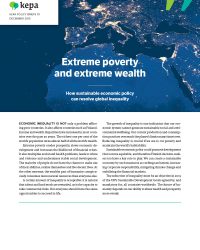Economic inequality is not only a problem afflicting poor countries. It also affects countries such as Finland. Income and wealth disparities have increased in most countries over the past 30 years. The richest one per cent of the world’s population owns almost half of all the world’s wealth.Extreme poverty erodes prosperity, slows economic development and increases the likelihood of financial crises. It also multiplies social and health problems, leads to crime and violence and undermines stable social development. The majority of people do not have the chance to make use of their abilities, realise themselves and live decent lives. At the other extreme, the wealthy part of humanity conspicuously consumes more natural resources than everyone else.A certain amount of inequality is acceptable: it is natural that talent and hard work are rewarded, as is the capacity to take commercial risks. But everyone should have the same opportunities to succeed in life.The growth of inequality is one indication that our economic system cannot generate sustainable social and environmental wellbeing. Our current production and consumption practices overreach the planet’s limits many times over. Reducing inequality is crucial if we are to cut poverty and maintain the world’s habitability.Sustainable economic policy could promote development that is more equitable, and therefore decision-makers too have a key role to play. We can create a sustainable economy by such measures as curbing tax havens, increasing corporate responsibility, mitigating climate change and stabilising the financial markets.The reduction of inequality is an objective in 2015 of the UN’s Sustainable Development Goals agreed by, and mandatory for, all countries worldwide. The future of humanity depends on our ability to share wealth and prosperity more evenly.

Extreme poverty and extreme wealth – How sustainable economic policy can resolve global inequality
ISSN
1797-9412
Sähköisen version ISBN
978-952-200-238-9
Sivumäärä
20
Kieli
Englanti
Kirjoittajat
Henri Purje, Eva Nilsson
Julkaistu
31.12.2015